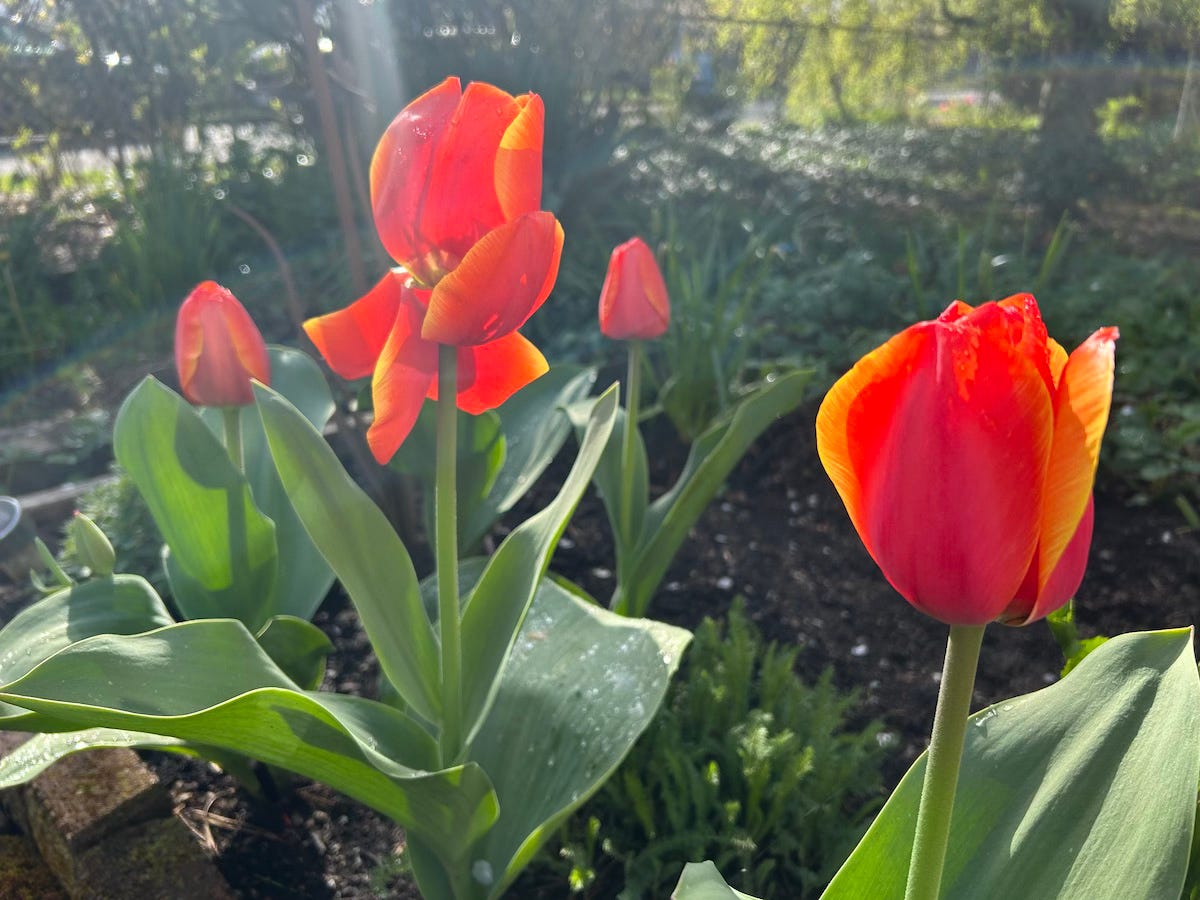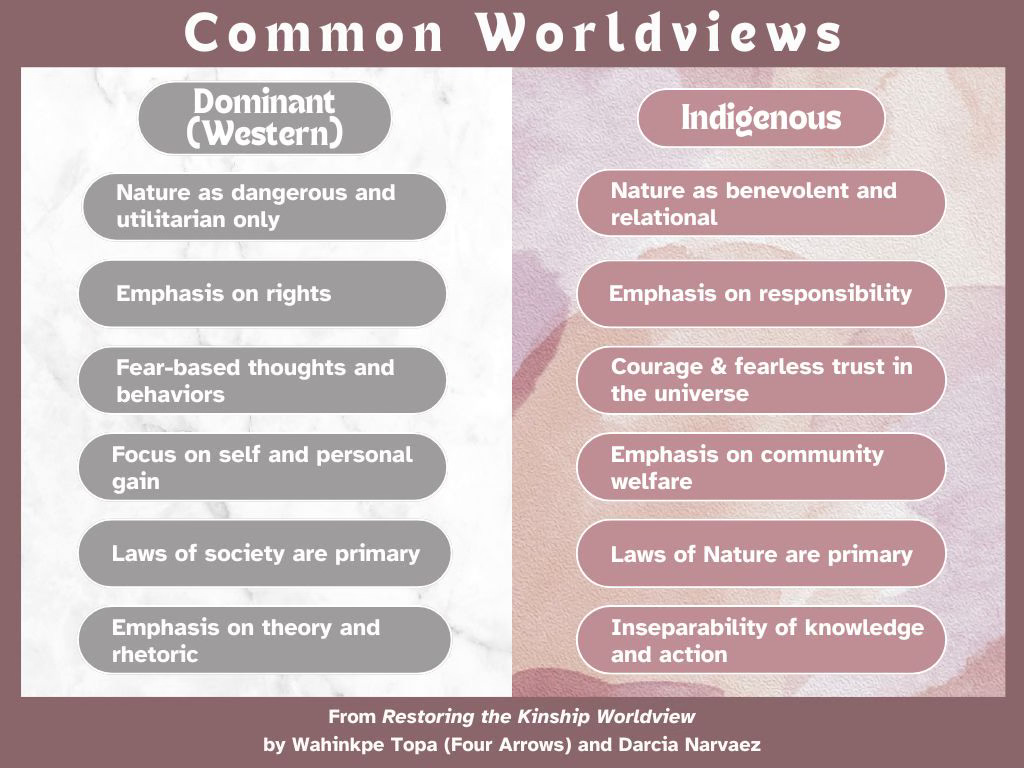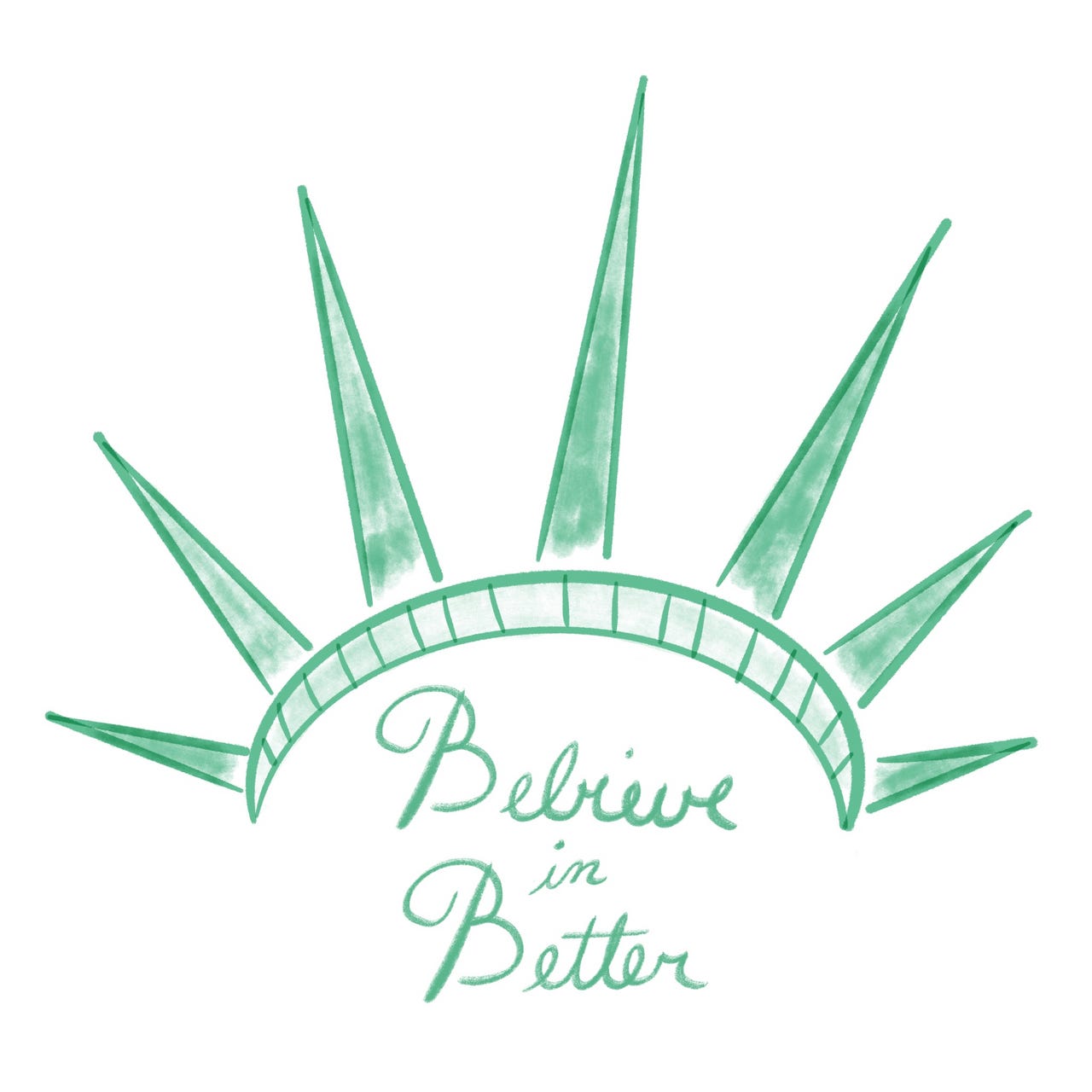Last fall, I planted some tulip bulbs in a garden bed by my front window. At the time, I had no idea just how scrumptious these bulbs are to squirrels… but it quickly became apparent when I kept finding empty holes and dug-up bulbs strewn about. I replanted them every time I found one, but it seemed like a losing game. “It’ll be a miracle if any tulips come up in the spring,” I thought.
And yet… they survived! (Well, most of them, anyway.)

When they first sprouted, I was so excited. I couldn’t help but get swept up in their symbolism, seeing them as harbingers of spring, a statement on resilience, an affirmation that miracles can happen.
Okay, maybe I’m reading into this a little too much. But every small win this spring feels even sweeter, since there’s a current of dread underlying everything these days. And I’m certainly not immune to the chaos and panic that surrounds me—lately I’ve been fretting about the potential loss of my job/career (in scientific research), while at the same time holding the fact that others are facing far more serious, soul-crushing and life-destroying threats.
With the turn into this new season, I’ve decided that I’m done wringing my hands. I’m ready to move from thinking and analysis and waiting for the other shoe to drop, to actually doing stuff. In the real world. In my family, my neighborhood, my city. Because my sense is that this is only the beginning of the Tough Times™, and I know that the standard script—the one I’ve been following my whole life of “get a good job, work hard, keep your head down, accumulate personal wealth in the form of money/investments, and you will have safety and stability forever”—has never quite been true. It always had a shadow side, one that could be easily ignored by those who were rewarded for following the standard script. But the shadow was there nevertheless, and now it’s blocking out the sun, begging to be noticed.
What, exactly, does it mean to go off-script? For me, it’s letting go of the expectation that I’ll always have steady employment and benefits like health insurance. It’s figuring out how to deal with instability and uncertainty. It’s unplugging—from the matrix, yes, but also from devices, spending less time on my phone and laptop, more on writing in actual notebooks and being outside tending the land. It’s shifting focus from wealth-building to relationship-building.
Going off-script is scary. It’s like stepping to the edge of a cliff and staring into a yawning void. It looks like there’s nothing to catch you. If you step off, you’ll go to a place where many people you love cannot follow or understand. It’s terrifying to feel like you will be alone.
But I know—because though I’ve adhered to, and benefitted from, the standard script in many ways, I also have plenty of experience veering away from it—that there is something beautiful in the dark void, which in fact is not emptiness at all, but rich soil full of nourishment. It does, however, require adjusting to a new way of being.
As I scan the news each day, it becomes more and more apparent that the cudgel currently being used to wield power and breed submission is standard-issue capitalism. But the tricky thing about capitalism is that it is not just an economic system. We have woven it into our way of life, fusing it with the values of colonialism and patriarchy, embedding it so deeply into our systems and experiences and psyches that it is like the air we breathe: omnipresent yet invisible. We can’t even see how profoundly it has affected our way of thinking—our entire worldview.
Worldview, as defined by Wahinkpe Topa (Four Arrows) and Darcia Narvaez in Restoring the Kinship Worldview, “goes deeper than culture, religion, or philosophy, all of which are fueled by the underlying assumptions we have.” Their book explores specific examples in detail, contrasting the worldviews common in our dominant culture to those found in a variety of indigenous ones.

Unless these deeper assumptions are made conscious, questioned, and rewritten, we will always end up repeating the same old script, the same old patterns—even when we’re doing things that seem “countercultural.”
For example: back in the mid-aughts and early 2010’s, I got really into urban homesteading. I’m the kind of person who, when I had to do chores as a child, would put on an old-timey bonnet and pretend I was tending to my family’s farm. So the idea of creating my own homestead really, really appealed to me.
It didn’t take long for reality to sink in, though. After all, farming is a roller coaster, requiring a huge amount of time and labor that may not pay off in terms of yield—or that yields way more than you can actually handle, such as the stereotypical glut of zucchini. And while I loved (and still love) certain parts of this movement and the DIY ethos surrounding it, other aspects did not sit well with me. Most notably: the idea of “self-sufficiency,” the underlying goal of many a homesteader. I mean, I certainly understand the appeal. To get your needs met through your own sweat and grit and perseverance, without having to rely upon anyone else. That right there is a story that has been flowing through American blood since the country’s inception.
It’s also a myth. One that I sometimes buy into, because cultural currents are powerful. But every time I start drifting that way, a part of me says quite forcefully, nope. It knows that walling ourselves off from each other, fending for ourselves and becoming convinced that we can’t trust anyone… that is what keeps the wheels of capitalism nicely greased. And when this isolationist, hyper-individualistic mindset combines with any way of living—or any alternative political, economic, or belief system, for that matter—you get… the mirror world we have fallen headlong into, where lifestyles entered into with good intentions become rigid and divisive, obsessed with purity, so fixated on specific details that the bigger picture is completely lost. Underlying it all is our hauntedness, and, of course, an omnipresent cloud of fear. Fear of becoming polluted by toxins. Fear of disability, of having to depend on others. Fear of death. It’s nice to believe that if you live life just right, you’ll have control over all these things.
But what actually gives us true protection? A strong social safety net. People (and other nonhuman allies) that we know will have our backs when a crisis is thrown in our path. In the absence of being provided one by the country we live in, we must weave our own. This takes time. It takes a lot of giving, and receiving, and relationship-building. (And it’s extremely challenging for a socially-anxious solitude-loving introvert like myself!) But it’s the only way to truly break free.
There’s a famous Audre Lorde quote that is rattling around a lot in my feed and in my head these days:
The master’s tools will never dismantle the master’s house. They may allow us temporarily to beat him at his own game, but they will never enable us to bring about genuine change. And this fact is only threatening to those women who still define the master’s house as their only source of support.
Ouch. But also, truth. I’ll be honest: the master’s house has been a good shelter for me. It’s clean and tidy and it feels safe, surrounded as it is by a tall gate. But lately I’ve been noticing the sagging floorboards, the buckling walls. The master just slaps on a fresh coat of paint and says everything’s fine, but in my heart I know that the foundation is rotting away. So although the master tries to scare me into staying by telling me horrifying tales of what awaits me Out There, I know I can’t stay here any longer. Not only am I growing disillusioned with life inside a comfortable cage, but I want to get out before I get crushed when it inevitably falls.
Not far beyond the gate, though, there is another house. A house that is very old. Its walls are living tree branches that have been woven together and have grown into each other, so you can hardly tell where one tree ends and another begins. And it is not one house but a community of them clustered around a common area where neighbors mingle and cook, play music and mind the children, laugh and grieve, make messes and clean them up. Sometimes it’s bumbling and awkward, and it’s never perfect, but it’s so much more full of life than the master’s house could ever be.
This is the house I’m moving into. Not “when things settle down.” Not “when I figure out exactly what to do and have a clear strategic plan.” Not “someday, when I have more time and space.” After all, this isn’t really a physical move, but a psychological one: a rewriting of those underlying assumptions, and a lifestyle shift to accompany them. I’m starting right now, right here, with the resources I already have—and with anyone else who is ready to go off-script with me and start writing a new story, together.
Reading/Listening Recommendations
I know that going off-script is going to require some big shifts in the balance of my life, so I’ll be taking some time off from writing in this space. In the meantime, I’ll leave you with a nice hefty list of reading/listening recommendations to dig into.
~Collection 1: Warm Hugs~
If you’re at the end of your rope and need some solace, the next few resources might be up your alley.
💖Webinar Series: Love as the Antidote to Authoritarianism
I always find Valarie Kaur’s work on Revolutionary Love inspiring, and have been enjoying her new book Sage Warrior. She’ll be hosting a free webinar series starting on April 16 exploring how to harness love as a force for courageous action. Sign me up!
🌻Newsletter: Believe in Better
I recommend subscribing to this newsletter if you’ll miss having me in your inbox! This space will highlight the good work people are already doing, the other worlds that are already being built. I’m looking forward to following along with it as I embark on my own journey away from the standard script.
🎶Podcast episode: On Singing to the Beloved in Times of Crisis (The Emerald)
I’m very bad at actually listening to podcasts (though I love them, I can never manage to keep up with all the great stuff out there), but this episode stopped me in my tracks because it articulated something I’d been feeling but hadn’t been able to put into words. It’s a long one, so I spread out my listen over several days and enjoyed escaping into it every time.
~Collection 2: Wise Words~
The following resources can offer a better understanding of what is happening and fortify yourself for what is ahead. These might not be “feel-good” reads—but then again, we aren’t exactly living in feel-good times. Highly recommend checking them out when you’re feeling resourced.
🦉Book: Who Do We Choose to Be by Margaret Wheatley
This book takes the long view, exploring where we are now by examining historical patterns. Very eye-opening and sobering.
☄️Article: Find purpose in community outside your job & play a role in the revolution (Cosmic Anarchy)
This one may hurt a little, but it really put things into perspective for me (and was a big inspiration for this post, including the Audre Lorde reference).
🌑Book: Opening to Darkness by Zenju Earthlyn Manuel
While reading this book, I was constantly challenged to re-think what “darkness” even means. We tend to ascribe everything that is evil and bad to the dark, and get so uncomfortable when we go through “dark times” that we don’t even allow our vision to adjust to the dim landscape, because we’re so anxious for the return of the light. Yet darkness also invokes the velvety dark of the cave where ancient shamans traveled to commune with the otherworld; the pulsing warm darkness of the womb; the fertile earth. An appreciation for darkness can only be felt by dwelling there for a while. This book is an indispensable guide in that journey.
~Collection 3: Blueprints for a Better World~
As I make this lifestyle shift, I’m very grateful to those who have long been practicing other ways of being. Alternative scripts—ready-made blueprints—already exist.
🌱Book: Restoring the Kinship Worldview
As mentioned above, I’ve drawn a lot of inspiration from Restoring the Kinship Worldview. It is a bit scholarly, but I appreciate the way that it systematically breaks down the particulars of an indigenous worldview (as the authors note, they attempted to distill the similar underlying worldviews of various indigenous nations and cultures). It should also be emphasized that this is not at all about appropriating specific cultural practices, but about rewiring the fundamental ways we see and interact with the world.
🌎Website: White Supremacy Culture
Another resource I’ll be returning to is White Supremacy Culture, a wealth of information and perspective compiled by Tema Okun. This website offers antidotes for a variety of characteristics that are deeply entrenched within our dominant culture.
🌳Article: The Serviceberry by Robin Wall Kimmerer
I haven’t read Robin Wall Kimmerer’s new book yet, but based on the title, I’m guessing this essay was the seed for that longer work. Her writing is always gorgeous and inspiring.
One More Thing: Digital Version of Be Not Afraid Cards
ICYMI, I made a printable version of a card deck full of practices for dealing with fear, and decided to turn them into a digital version too. Now you can download a phone-friendly PDF and scroll to a random page to choose your card for the day. 😊








♥️♥️♥️♥️♥️